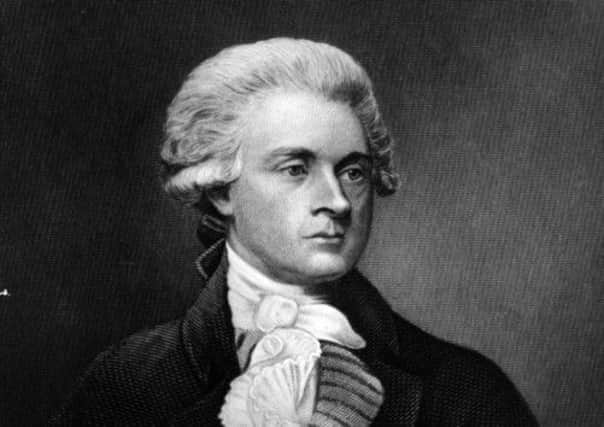Gerald Warner: Egotists of the Enlightenment wreaked destruction on mankind


The Pseudo-Enlightenment has long been a totemic, if ill-defined, phenomenon in the liberal worldview.
Beyond the self-serving attempt to confect an opposing moral order to the Judaeo-Christian ethic, however, that disastrous 18th-century aberration exercises a real and malign influence on society today. In Britain, for example, our schools may notionally be controlled by the two Michaels – Gove and Russell – but the reality is even worse: they are in thrall to Jean-Jacques Rousseau. Child-centred education and every other 21st-century pedagogic delusion ultimately has its origins in Émile, the educational tract written by Rousseau after he had, in the best traditions of utilitarianism, consigned his own children to an orphanage.
Advertisement
Hide AdAdvertisement
Hide AdSuch hypocrisy was axiomatic among 18th-century liberals. In America, the iconic Enlightenment figure was Thomas Jefferson, apostle of freedom and slave owner. You know how it is: you are just admiring a splendid piece of prose you have penned, proclaiming the “self-evident truth” that men are “endowed by their Creator with certain unalienable rights; that among these are life, liberty, and the pursuit of happiness”, when you are distracted by the plantation overseer plucking at your sleeve to report that a slave has done a runner but the dogs should bring him down before sunset.
The world has been ill served by historians and philosophers in their interpretation of the “Enlightenment”: there is possibly no other historical movement that has been so contradictorily and chaotically represented. There is even a school that claims Rousseau was the first Counter-Enlightenment commentator. The original and true enemies of the philosophes were Edmund Burke, Joseph de Maistre, Augustin Barruel and Louis de Bonald. Burke’s analysis of the responsibility of the Pseudo-Enlightenment for the catastrophe of the French Revolution has never been bettered; Maistre was particularly insightful in his denunciation of paper constitutions; Bonald’s writing against divorce, not a prominent issue at the time, was prescient.
By now, the “Enlightenment” has been attacked by Nietzsche, the Frankfurt Marxists, feminists, critical theorists and the circus that calls itself “postmodernism”. This incoherence reflects the desire of the many cults descended from the Enlightenment to deny that paternity. The corollary is the attempt by apologists for the Enlightenment to disown any consequence that is embarrassing: Jacobinism and its twin offspring Nazism and Communism, as well as many other totalitarian, secularist initiatives that have blighted humanity. It was no coincidence that Voltaire’s chief patron was the despot Frederick the Great.
The defining characteristic of the Pseudo-Enlightenment was its hatred of Christianity and of the sanctified moral order it had created. Its essential maxim was Voltaire’s intemperate shriek against the Church: “Écrasez l’infâme!” Modern militant secularism pursues that vendetta. The “Aufklärung”, in the course of the 18th century, progressed from cautious Deism to aggressive atheism. Its antecedents lay in the Renaissance and the Reformation: the first introduced humanism, with its anthropocentric reductionism, even into the Catholic Church, where it is again wreaking havoc today; the latter sundered Christendom.
The Enlightenment was the reverse of what it pretended to be. So, far from broadening man’s vision, it narrowed it. David Hume’s empiricism ultimately implied the rejection of the metaphysical dimension, from which the highest human inspiration derives. While there was a woolly, Deist component in much Enlightenment thought, it was a speculative, freemasonic esotericism, with Gnostic undertones, that represented a complete departure from Christian spirituality. Its arrogant hijacking of “Reason” was its most flagrant hypocrisy. Reason did not enter European thought with the philosophes: it was central to Catholic theology. Not only St Thomas Aquinas held that God could be approached through reason; even the Spanish mystic St John of the Cross insisted that reason should take precedence over private revelations.
The Enlightenment-derived secularism of today has reduced mankind’s self-esteem and, consequently, self-respect. A 12th-century serf believed he possessed an immortal soul, with the moral responsibilities that entailed; today, a Nobel prize-winner is likely to believe he has no more immortality than a dog, with a consequent lowering of his self-perception to animal status. This loss of a metaphysical consciousness is reflected in the ugliness and triviality of contemporary art, architecture and literature. In repudiating divine revelation, the egotists of the 18th century condemned humanity to the aridity of neo-pagan scepticism. Technological distractions cannot forever divert society from recognising the futility of such an existence. The Enlightenment’s political legacy has exhausted its credibility; it is time to revisit everything it destroyed and initiate a process of reconstruction.
Twitter: @GeraldWarner1